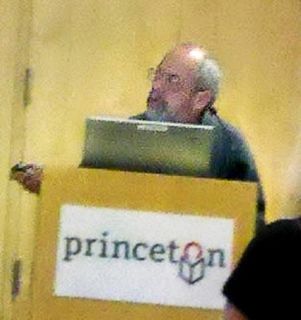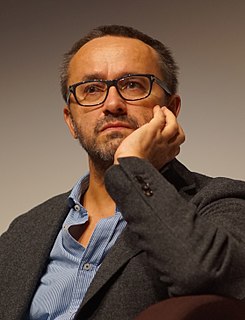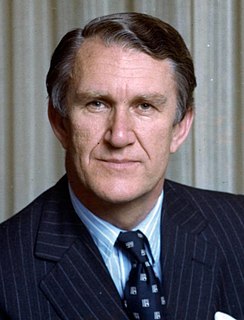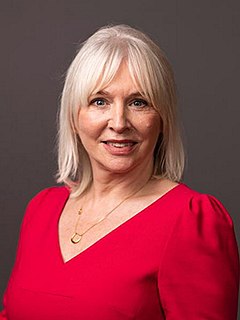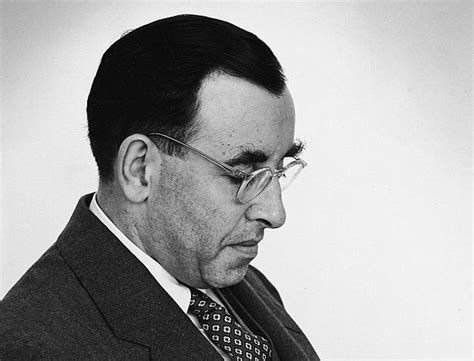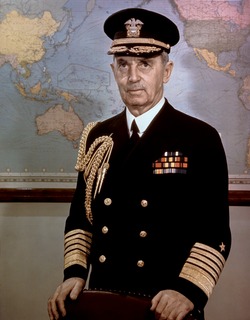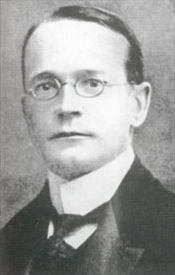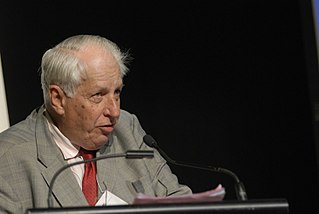Top 1161 Ethical Dilemmas Quotes & Sayings - Page 19
Explore popular Ethical Dilemmas quotes.
Last updated on December 19, 2024.
Time will prolong time, and life will serve life. In this field that is both limited and bulging with possibilities, everything to himself, except his lucidity, seems unforeseeable to him. What rule, then, could emanate from that unreasonable order? The only truth that might seem instructive to him is not formal: it comes to life and unfolds in men. The absurd mind cannot so much expect ethical rules at the end of its reasoning as, rather, illustrations and the breath of human lives.
The question is, when so many others cut corners, shave the truth, self-deal, believe in the fast buck, and follow the crowd along the low road of least resistance, can we even afford to travel the high road of ethical behavior? Frankly, we can't afford anything else. Any other competitive angle is a pure crapshoot in today's business world. Companies with shaky ethics and shabby standards will be crippled as they try to compete in our changing world.
Everyone seems to assume that the unscrupulous parts of journalism will be the frivolous or jocular parts. This is against all ethical experience. Jokes are generally honest. Complete solemnity is almost always dishonest. The writer of the snippet merely refers to a frivolous and fugitive fact in a frivolous and fugitive way. The writer of the leading article has to write about a fact he has known for 20 minutes as though he has studied it for 20 years.
Granted the endless variations of moral customs, still the essential standards persist. As in a scientific laboratory, all else may change but the standards are unalterable- disinterested love of truth, fidelity to facts, accuracy in measurement, exactness of verification-so, in life as a whole, the towering ethical criteria remain unshaken. Falsehood is never better than truth, theft better than than honesty, treachery better than loyalty, cowardice better than courage.
Here is the point about myself and my co-thinkers. Our belief is not a belief. Our principles are not a faith. We do not hold our convictions dogmatically. We believe with certainty that an ethical life can be lived without religion. And we know for a fact that the corollary holds true - that religion has caused innumerate people not just to conduct themselves no better than others, but to award themselves permission to behave in ways that would make a brothel-keeper or an ethnic cleanser raise an eyebrow.
Instead of a bottom-line based on money and power, we need a new bottom-line that defines productivity and creativity as where corporations, governments, schools, public institutions, and social practices are judged as efficient, rational and productive not only to the extent they maximize money and power, but to the extent they maximize love and caring, ethical and ecological sensitivity, and our capacities to respond with awe and wonder at the grandeur of creation.
There have been a number of philosophers who have reveled in the dismantling of truth. I think they did so with good ethical motives, and for good philosophical reasons. I can see the sense in what they were talking about; the idea that truth is often claimed by elites in order to further certain agendas. They crowd-out alternative perspectives - particularly those of the powerless. But the undermining of truth contributed - in the weird, indirect way that philosophy contributes to the culture - to a rejection of the idea of truth as having any kind of proper meaning at all.
We have voluntarily agreed to let an invisible government sift the data and high-spot the outstanding issues so that our field of choice shall be narrowed to practical proportions. From our leaders and the media they use to reach the public, we accept the evidence and the demarcation of issues bearing upon public questions; from some ethical teacher, be it a minister, a favorite essayist, or merely prevailing opinion, we accept a standardized code of social conduct to which we conform most of the time.
Rational thinking which is free from assumptions ends therefore in mysticism. To relate oneself in the spirit of reverence for life to the multiform manifestations of the will-to-live which together constitute the world is ethical mysticism. All profound world-view is mysticism, the essence of which is just this: that out of my unsophisticated and naïve existence in the world there comes, as a result of thought about self and the world, spiritual self-devotion to the mysterious infinite Will which is continuously manifested in the universe.
As for the ethics, law, and politics relationship, there has always been a tension for me as I try to keep them distinct while recognizing their interactions. A valuable contribution to my thinking there and elsewhere was Ellen Meiksins Wood's Mind and Politics, which reinforced for me the ways in which seemingly disparate philosophical endeavors were/are interconnected, and although I have tended to give a certain priority to ethical considerations as part of practical reasoning, I am reminded often enough that this position makes some contentious presumptions .
As Muslims, our interests are our values. In any society, be it in Western or Muslim-majority countries, our duty is that of critical loyalty: Staying loyal to our countries by always being critically engaged in the name of the principles of justice, equality and human brotherhood. We should be the ethical and moral voice wherever we are by saying that, even though we understand economic and geo-strategic interests, we cannot accept a violation of these principles by any society.
The more truthful I am with myself and others, the more my conscience is clear and tranquil. Thus, I can more thoroughly and unequivocally inhabit the present moment and accept everything that happens without fear, knowing that what goes around comes around (the law of karma). Ethical morality and self-discipline represent the good ground, or stable basis. Mindful awareness is the skillful and efficacious grow-path, or way. Wisdom and compassion constitute the fruit, or result. This is the essence of Buddhism [...]
In contemporary society secular humanism has been singled out by critics and proponents alike as a position sharply distinguishable from any religious formulation. Religious fundamentalists in the United States have waged a campaign against secular humanism, claiming that it is a rival "religion" and seeking to root it out from American public life. Secular humanism is avowedly non-religious. It is a eupraxsophy (good practical wisdom), which draws its basic principles and ethical values from science, ethics, and philosophy.
Kantian ethical theory distinguishes three levels: First, that of a fundamental principle (the categorical imperative, formulated in three main ways in Kant's Groundwork); second, a set of duties, not deduced from but derived from this principle, by way of its interpretation or specification, its application to the general conditions of human life - which Kant does in the Doctrine of virtue, the second main part of the Metaphysics of Morals; and then finally an act of judgment, through which these duties are applied to particular cases.
Modern societies accepted the treasures and the power offered them by science. But they have not accepted - they have scarcely even heard - its profounder message: the defining of a new and unique source of truth, and the demand for a thorough revision of ethical premises, for a complete break with the animist tradition, the definitive abandonment of the 'old covenant', the necessity of forging a new one. Armed with all the powers, enjoying all the riches they owe to science, our societies are still trying to live by and to teach systems of values already blasted at the root by science itself.
Robert Torricelli, a powerful fund-raiser who helped raise more than $100 million for the Democratic party, took inappropriate gifts from a businessman, including an $8,000 gold Rolex watch, for which he was severely admonished by the Senate Ethics Committee in July. To recap: raising $100 million in contributions from gigantic corporations - ethical; taking a watch - unethical. That's the Senate Ethics Committee, an oxymoron since 1974.
The overriding need is "to develop a new Planetary Humanism" that will seek to preserve human rights and enhance human freedom and dignity and will emphasize our commitment "to humanity as a whole." The underlying ethical principle "is the need to respect the dignity and worth of all persons in the world community." Thinkers as diverse as Peter Singer and Hans Küng also emphasize the need for a new global ethic beyond nationalistic, racial, religious, and ethnic chauvinism.
The moral problem of abortion is of a pre religious nature because the genetic code is written in a person at the moment of conception. A human being is there. I separate the topic of abortion from any specifically religious notions. It is a scientific problem. Not to allow the further development of a being which already has all the genetic code of a human being is not ethical. The right to life is the first among human rights. To abort a child is to kill someone who cannot defend himself.
People, Reacher was certain about. Dogs were different. People had freedom of choice. If a man or a woman ran snarling toward him, they did so because they chose to. They were asking for whatever they got. His response was their problem. But dogs were different. No free will. Easily misled. It raised an ethical problem. Shooting a dog because it had been induced to do something unwise was not the sort of thing Reacher wanted to do.
What does it really mean to be a leftist in the early part of the 21st century? What are we really talking about? And I can just be very candid with you. It means to have a certain kind of temperament, to make certain kinds of political and ethical choices, and to exercise certain analytical focuses in targeting on the catastrophic and the monstrous, the scandalous, the traumatic, that are often hidden and concealed in the deodorized and manicured discourses of the mainstream. That's what it means to be a leftist. So let's just be clear about it.
A growing body of social science research reveals that atheists, and non-religious people in general, are far from the unsavory beings many assume them to be. On basic questions of morality and human decency - issues such as governmental use of torture, the death penalty, punitive hitting of children, racism, sexism, homophobia, anti-Semitism, environmental degradation or human rights - the irreligious tend to be more ethical than their religious peers, particularly compared with those who describe themselves as very religious.
The adolescent frequently supposes that she is breaking out of the confines of her mundane, schoolgirl existence simply in order to break rules and defy authority. . . . She rids herself of the "oughts" and "musts" that convert every minor infraction into a sin of omission or commission. It certainly does not occur to her or to her family that by questioning the moral standards she erected as a child she is taking the first steps in her journey toward a firmer, more reasonable, less harsh, more ethical form of conscience.
The friends of Job appear on the scene as advisers and "consolers," offering Job the fruits of their moral scientia. But when Job insists that his sufferings have no explanation and that he cannot discover the reason for them through conventional ethical concepts, his friends turn into accusers, and curse Job as a sinner. Thus, instead of consolers, they become torturers by virtue of their very morality, and in so doing, while claiming to be advocates of God, they act as instruments of the devil.
All the world suffers from the usury of the Jews, their monopolies and deceit. They have brought many unfortunate people into a state of poverty, especially the farmers, working class people and the very poor. Then as now Jews have to be reminded intermittently anew that they were enjoying rights in any country since they left Palestine and the Arabian desert, and subsequently their ethical and moral doctrines as well as their deeds rightly deserve to be exposed to criticism in whatever country they happen to live.
Church, the spiritual power, and the executive power are working today united in a system that confronts people. This alliance or cooperation between the spiritual power and the executive power, between the church and the government, unfortunately takes away the Church's basic mission. It takes away their right to speak on moral or ethical subjects.
At the moment people get on boats because they flee terror at home and believe the many years' long wait in UNHCR camps is not a valid option, especially if they have children in their care. After the Vietnam War, Australia took a larger humanitarian intake than at any other period in our history. The Australian community accepted that. They were told why we needed to do it, and why it was the only ethical decent policy that a wealthy advanced country should adopt.
It is so hard for an evolutionary biologist to write about extinction caused by human stupidity. Let me then float an unconventional plea, the inverse of the usual argument. The extinction of Partula is unfair to Partula. That is the conventional argument, and I do not challenge its primacy. But we need a humanistic ecology as well, both for the practical reason that people will always touch people more than snails do or can, and for the moral reason that humans are legitimately the measure of all ethical questions for these are our issues, not nature's.
Ethical religion affirms the continuity of progress toward moral perfection. It affirms that the spiritual development of the human race cannot be prematurely cut off, either gradually or suddenly; that every stone of offence against which we stumble is a stepping-stone to some greater good; that, at the end of days, if we choose to put it so, or, rather, in some sphere beyond the world of space and time, all the rays of progress will be summed and centred in a transcendent focus.
Scientific theories never dictate human values, but they can often cast new light on ethical issues. From a sexual selection viewpoint, moral philosophy and political theory have mostly been attempts to shift male human sexual competitiveness from physical violence to the peaceful accumulation of wealth and status. The rights to life, liberty, and property are cultural inventions that function, in part, to keep males from killing and stealing from one another while they compete to attract sexual partners.
Spinoza , for example, thought that insight into the essence of reality, into the harmonious structure of the eternal universe, necessarily awakens love for this universe. For him, ethical conduct is entirely determined by such insight into nature, just as our devotion to a person may be determined by insight into his greatness or genius. Fears and petty passions, alien to the great love of the universe, which is logos itself, will vanish, according to Spinoza, once our understanding of reality is deep enough.
The formation of character in young people is educationally a different task from, and a prior task to, the discussion of the great, difficult, ethical controversies of the day. First things first. And planting the ideas of virtue, of good traits in the young, comes first. In the moral life, as in life itself, we take one step at a time. Every field has its complexities and controversies. And so does ethics. And every field has its basics. So too with values.
Throughout the history of commercial life nobody has ever quite liked the commission man. His function is too vague, his presence always seems one too many, his profit looks too easy, and even when you admit that he has a necessary function, you feel that this function is, as it were, a personification of something that in an ethical society would not need to exist. If people could deal with one another honestly, they would not need agents.
The legal system doesn't always serve as a good guide for your conscience. You can step way over the ethical line and still be inside the law. The same thing goes for rules, policies and procedures - you know, the organization's "internal laws." You can "go by the book" and still behave unethically. Still not move beyond mediocrity. High standards-the ethics of excellence-come to life through your basic values, your character, integrity and honesty. Obeying the law is the bare minimum.
In our childhoods we either get all the social and emotional and ethical skills we need to be well adjusted adults, or we don't. Some of us don't know how to tell someone we like them. A lot of us get depressed and get wasted. Why don't we do something that makes us feel better? Because we don't know any other way. When I didn't have enough skills I compensated with drugs and alcohol. It's like there was a hole in the wall and I put a poster over it.
Our ego ideal is precious to us because it repairs a loss of our earlier childhood, the loss of our image of self as perfect and whole, the loss of a major portion of our infantile, limitless, ain't-I-wonderful narcissism which we had to give up in the face of compelling reality. Modified and reshaped into ethical goals and moral standards and a vision of what at our finest we might be, our dream of perfection lives on--our lost narcissism lives on--in our ego ideal.
If we understand the mechanisms and motives of the group mind, it is now possible to control and regiment the masses according to our will without their knowing it In almost every act of our daily lives, whether in the sphere of politics or business, in our social conduct or our ethical thinking, we are dominated by the relatively small number of persons who understand the mental processes and social patterns of the masses. It is they who pull the wires which control the public mind.
Are we going to continue to yield personal liberties and community autonomy to the steady inexplicable centralization all political power or restore the Republic to Constitutional direction, regain our personal liberties and reassume the individual state's primary responsibility and authority in the conduct of local affairs? Are we going to permit a continuing decline in public and private morality or re-establish high ethical standards as the means of regaining a diminishing faith in the integrity of our public and private institutions?
The public takes little notice of those who want to abolish abortion. They are dismissed as extremists. If I were to argue that all abortions should be banned, the ethical discussions would go round in circles.... My view is that the only way forward is to argue for a reduction in the time limit... saving some lives is better than saving no lives at all. I hope pro-lifers will come to share my view that some progress is better than no progress.
It seems to me that the idea of a personal God is an anthropological concept which I cannot take seriously. I also cannot imagine some will or goal outside the human sphere... Science has been charged with undermining morality, but the charge is unjust. A man's ethical behavior should be based effectually on sympathy, education, and social ties and needs; no religious basis is necessary. Man would indeed be in a poor way if he had to be restrained by fear of punishment and hope of reward after death.
When Catholicism goes bad it becomes the world-old, world-wide religio of amulets and holy places and priestcraft. Protestantism,in its corresponding decay, becomes a vague mist of ethical platitudes. Catholicism is accused of being too much like all the other religions; Protestantism of being insufficiently like a religion at all. Hence Plato, with his transcendent Forms, is the doctor of Protestants; Aristotle, with his immanent Forms, the doctor of Catholics.
I think there are three types of actors. There are the ones that do the ego thing, which is "I'm never going to look bad in a movie, ever." This is mostly the action film dudes, like, "Nah, hell no. He ain't punchin' me! I'd whoop his ass!" Then you've got the activist type who bases their decisions in the development of a character on what it symbolizes to society - what the ethical code is. And then the third type is a true thespian who doesn't give a flying rat's ass what it is as long as it's deep, powerful, and painful, and they will dive in headfirst. I really respect those people.
Religion is not about accepting twenty impossible propositions before breakfast, but about doing things that change you. It is a moral aesthetic, an ethical alchemy. If you behave in a certain way, you will be transformed. The myths and laws of religion are not true because they they conform to some metaphysical, scientific or historical reality but because they are life enhancing. They tell you how human nature functions, but you will not discover their truth unless you apply these myths and doctrines to your own life and put them into practice.
Failure to summon forth the courage to risk a nondogmatic and nonevasive stance on such crucial existential matters can also blur our ethical vision. If our actions in the world are to stem from an encounter with what is central in life, they must be unclouded by either dogma or prevarication. Agnosticism is no excuse for indecision. If anything, it is a catalyst for action; for in shifting concern away from a future life and back to the present, it demands an ethics of empathy rather than a metaphysics of fear and hope.
In their struggle for the ethical good, teachers of religion must have the stature to give up the doctrine of a personal god, that is, give up that source of fear and hope which in the past placed such vast power in the hands of priests. In their labors they will have to avail themselves of those forces which are capable of cultivating the Good, the True, and the Beautiful in humanity itself. This is, to be sure, a more difficult but an incomparably more worthy task.
To the man who is truly ethical all life is sacred, including that which from the human point of view seems lower in the scale. He makes distinctions only as each case comes before him, and under the pressure of necessity, as, for example, when it falls to him to decide which of two lives he must sacrifice in order to preserve the other. But all through this series of decisions he is conscious of acting on subjective grounds and arbitrarily, and knows that he bears the responsibility for the life which is sacrificed.
Ethics and power are separate. Ethics and morality. I think life would be miserable if there weren't some kind of code that people operated by, but history is full of many, many people who have gotten power by very unethical means, and people who were very ethical, who get no power, people who have the most brilliant, lovely, wonderful, nice intentions and bring about horrible things in the world because they don't know how to play the power game.
Nothing in Chomsky's account acknowledges the difference between intending to kill a child, because of the effect you hope to produce on its parents (we call this “terrorism”), and inadvertently killing a child in an attempt to capture or kill an avowed child murderer (we call this “collateral damage”). In both cases a child has died, and in both cases it is a tragedy. But the ethical status of the perpetrators, be they individuals or states, could not be more distinct For Chomsky, intentions do not seem to matter. Body count is all.
In my path, three things are really important. One is associating with people who inspire us with their positive influence. The company we keep is very important. Number two is our spiritual practice. Putting aside sacred time every day to make that journey within, to tune into the frequency of our true nature and the love and the grace that is within us. Number three is to try living with ethical, moral and spiritual values, which culminates in unselfish service.
I think with the advent of Reagan, and subsequently, both parties, there's been a strong move towards the advantage given to the richer people, in taxation and grants and supplements and things of that kind. Primarily exacerbated more recently by the Supreme Court's stupid ruling on Citizens United, and now there's a massive flood of money into the political system that I think has subverted the essence of a moral and ethical standard that used to permeate American democracy. Now it's not an admirable process. I think we've gone backwards.
If the world is an aggregate of relatively independent regions, then any assumption of universal laws is false and a demand for universal norms tyrannical: only brute force (or seductive deception) can then bend the different moralities so that they fit the prescriptions of a single ethical system. And indeed, the idea of universal laws of nature and society arose in connection with a life-and-death battle: the battle that gave Zeus the power over the Titans and all other gods and thus turned his laws into the laws of the universe.
The ethical regime [of the Jews] was quite definitely Ptolemaic, revolving around the small group of Jews, not the larger Gentile group and, accordingly, they learned to remain unimpressed by Gentile temporal power. Being unimpressed did not mean being unafraid material power might beat or starve one to death; it did mean refusing to surrender moral hegemony to the majority merely because it had power.
The use of [the atomic bombs] at Hiroshima and Nagasaki was of no material assistance in our war against Japan. The Japanese were already defeated and ready to surrender because of the effective sea blockade and the successful bombing with conventional weapons... The lethal possibilities of atomic warfare in the future are frightening. My own feeling was that in being the first to use it, we had adopted an ethical standard common to the barbarians of the Dark Ages. I was not taught to make war in that fashion, and wars cannot be won by destroying women and children.
The idea that each individual has intrinsic, God-given value and is of infinite worth quite apart from any social contribution - an idea most pagans would have rejected as absurd - persists today as the ethical basis of western law and politics. Our secularized western idea of democratic society owes much to that early Christian vision of a new society - a society no longer formed by the natural bonds of family, tribe, or nation but by the voluntary choice of its members.
Evolution throws a wonderful light on all the struggles, eccentricities, tortuous developments of the human conscience in the past. It is the only theory of morals that does. And evolution throws just as much light on the ethical and social struggle today; and it is the only theory that does. What a strange age ours is from the religious point of view! What a hopeless age from the philosopher's point of view! Yet it is a very good age, the best that ever was. No evolutionist is a pessimist.
We like to pretend that our generous impulses come naturally. But the reality is we often become our kindest, most ethical selves only by seeing what it feels like to be a selfish jackass first. It's the reason... we have to get burned before we understand the power of fire; the reason our most meaningful relationships are so often those that continued beyond the very juncture at which they came the closest to ending.
Do you know this Sanskrit Shloka: "Let those who are versed in the ethical codes praise or blame, let Lakshmi, the goddess of Fortune, come or go wherever she wisheth, let death overtake him today or after a century, the wise man never swerves from the path of rectitude." Let people praise you or blame you, let fortune smile or frown upon you, let your body fall today or after a Yuga, see that you do not deviate from the path of Truth.
Barry Jones once said that Australia is the only country where the word 'academic' is a pejorative. The academic sector has a vibrant and practical role to play in this complex world of ours. Higher education and research are worthy of your much closer attention. Yes, we can be and should be the clever country. Our progress can be within the highest ethical and moral framework. But this will only happen if we place appropriate emphasis on education, research and innovation within a truly international framework.
I'm selfish, I think. I think an artist has to be. I'm not worried about what people think. I play the parts that I find interesting. It'd bother me more to be just pigeonholed into doing what people think is ethical or that's boring to me. I don't pick parts with that in mind, I just find interesting stories. If it's interesting to me, then I do it.
...how little our side of the industry did to move its business to the more ethical firms and to make a fuss about conflicted or unethical behavior. Had a number of us moved our business, we might have slowed or even stopped the 30-year slide in conflicted, unethical behavior that we have experienced. I, for one, regret the modest nature of our moves. We all could have done more. We have tolerated a pretty nasty decline in standards. Shame on us.



















